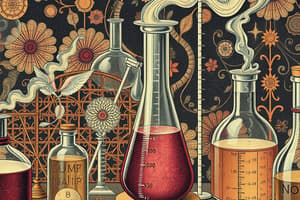Podcast
Questions and Answers
What is the length of the cylinder mentioned in the content?
What is the length of the cylinder mentioned in the content?
- 2.543 cm
- 5.6 cm
- 8.9 cm (correct)
- 10.0 cm
What type of error arises from defects in the measuring instrument?
What type of error arises from defects in the measuring instrument?
- Systematic error (correct)
- Human error
- External cause error
- Random error
Which column of the data table is both accurate and consistent?
Which column of the data table is both accurate and consistent?
- Column C
- None of the columns
- Column B
- Column A (correct)
What is the density of a body with a volume of 14.56 cm³ and mass of 20.589 g, rounded to three significant figures?
What is the density of a body with a volume of 14.56 cm³ and mass of 20.589 g, rounded to three significant figures?
What is the significance of measuring accuracy in scientific studies?
What is the significance of measuring accuracy in scientific studies?
The charge of an electron is approximately how much?
The charge of an electron is approximately how much?
Which error category is characterized by variations in external conditions?
Which error category is characterized by variations in external conditions?
What does the precision of a measurement refer to?
What does the precision of a measurement refer to?
What is the radius of Earth mentioned in scientific terms?
What is the radius of Earth mentioned in scientific terms?
Which statement is true regarding systematic errors?
Which statement is true regarding systematic errors?
Flashcards are hidden until you start studying
Study Notes
Cylinder Calculations
- Length of cylinder: 8.9 cm
- Radius of cylinder: 2.543 cm
- Curved surface area and volume should be expressed with appropriate significant figures.
Density Calculation
- Volume of body: 14.56 cm³
- Mass of body: 20.589 g
- Density is calculated and rounded to three significant figures.
Errors in Measurement
- Accuracy and precision (consistency) are critical in scientific measurements.
- Accuracy refers to the difference between the measured value and the true value, while precision is the difference between observed values and their mean.
- Observations by three observers (A, B, C) can show varying levels of accuracy and precision:
- Observer A: Accurate and precise data
- Observer B: Accurate but inconsistent (precise)
- Observer C: Neither accurate nor precise data.
Types of Measurement Errors
- Systematic errors: Arise from defined rules or conditions.
- Instrumental errors: Result from defects in measuring instruments (e.g., zero error or faulty graduation).
- Errors due to external causes: Caused by variations in external conditions affecting measurements.
Notable Scientific Constants
- Charge of electron: 1.6 x 10⁻¹⁹ C
- Order of magnitude: (10^{19} C)
- Mass of Earth: 5.983 x 10²⁴ kg
- Order of magnitude: (10^{24} kg)
- Radius of Earth: 6.378 x 10⁶ m
- Order of magnitude: (10^{7} m)
Importance of Measurement Accuracy
- Some inaccuracies and inconsistencies are inevitable despite careful measurement efforts.
- Identifying types and causes of errors is vital for minimizing inaccuracies in scientific research.
Studying That Suits You
Use AI to generate personalized quizzes and flashcards to suit your learning preferences.




